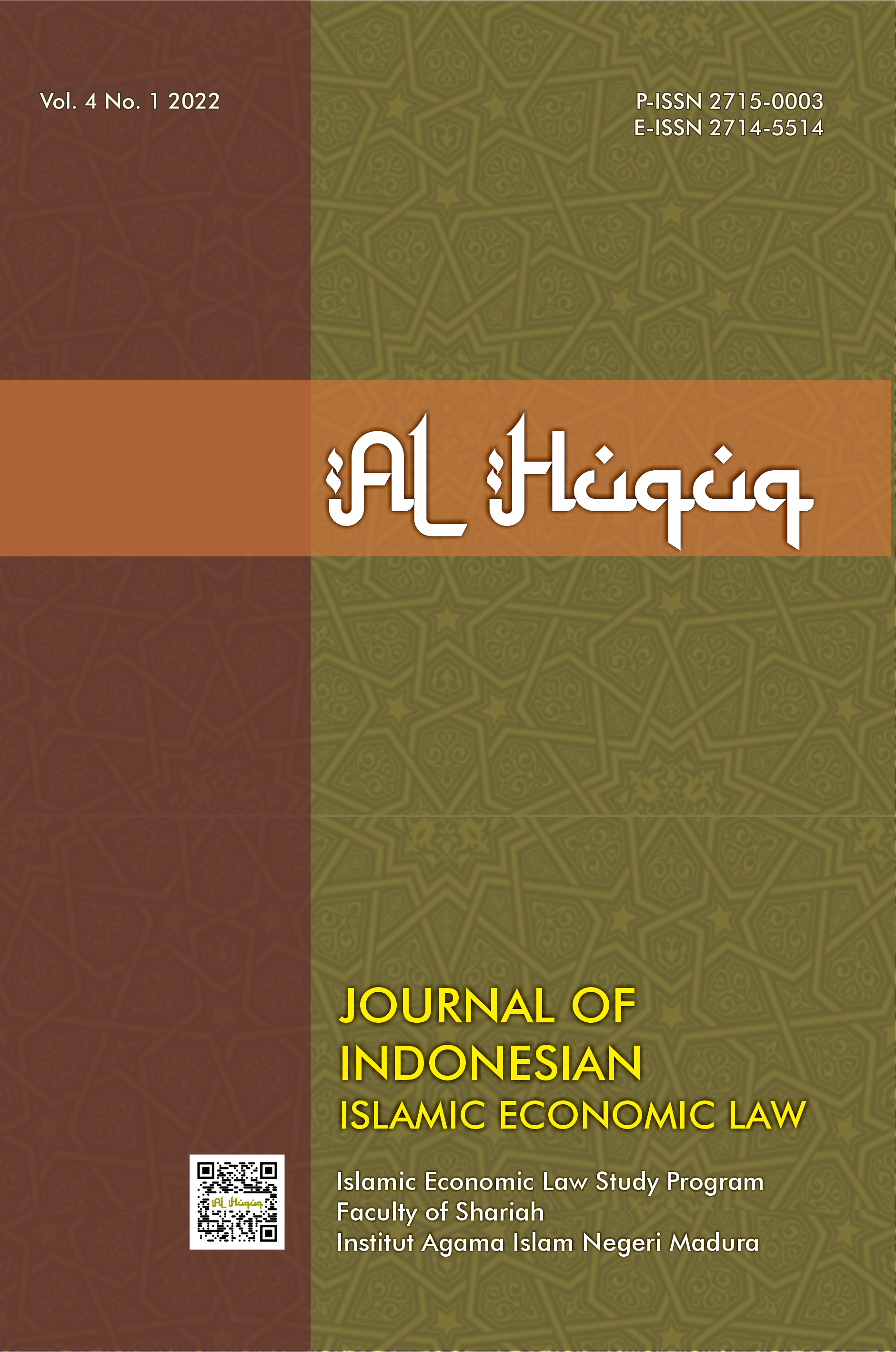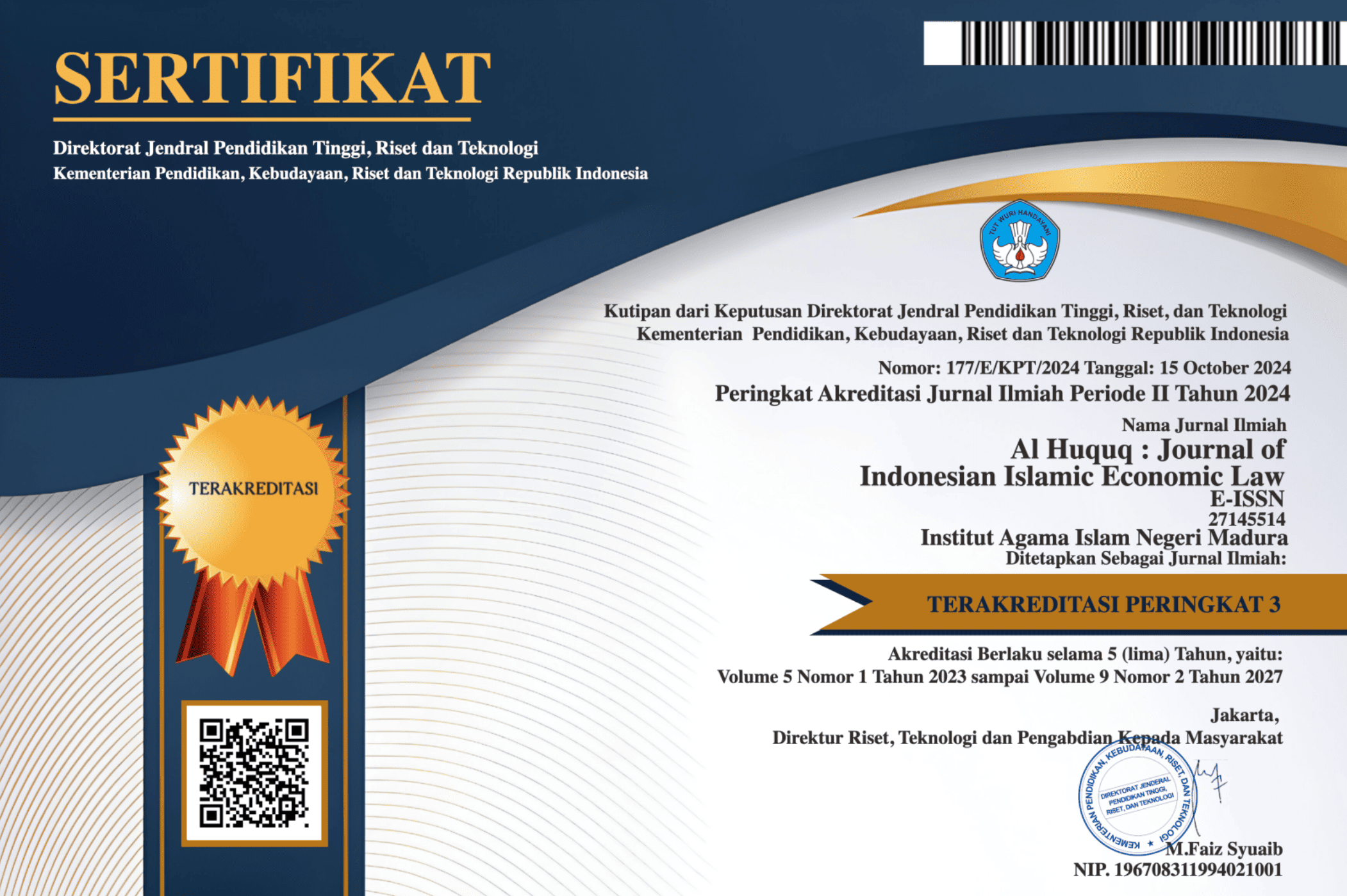Kontekstualisasi Fiqh Budgeting di Indonesia: Systematic Literature Review
 Abstract views: 497
,
Abstract views: 497
,
 PDF downloads: 484
PDF downloads: 484
Abstract
Korupsi dalam bentuk mark-up anggaran menjadi salah satu kasus yang cukup sering terjadi di Indonesia. Model penganggaran yang kurang transparan menjadi salah satu faktornya. Dalam kaitan ini, beberapa peneliti mengusulkan konsep integrasi penganggaran dengan menyuntikkan teori fiqh budgeting namun tataran aplikatif masih sangat minim. Oleh karena itu, penelitian ini bertujuan untuk melihat riset-riset mengenai fiqh budgeting, dalam jurnal-jurnal ilmiah di Indonesia, menilai relevansi dan keterbatasannya. Metodologi yang diadopsi dalam artikel ini adalah tinjauan pustaka sistematis. Pencarian artikel dilakukan secara sistematis melalui Google Scholar dan Bielefeld Academic Search Engine (BASE) dengan memilih literatur dari publikasi ilmiah di jurnal dan mengecualikan literatur yang berasal dari selain jurnal. Periode artikel yang dipilih adalah artikel jurnal terbitan 2010-2020. Penelitian penganggaran fikih di Indonesia masih minim pada tataran praktis. Selain itu, riset mengenai fiqh budgeting telah menghubungkan dengan konsep fiskal negara, namun temuan riset masih berupa konsep dan belum menyentuh aspek yang lebih aplikatif (terapan). Temuan penelitian saat ini menekankan pada dua aspek: pertama, perlu dilakukan kontekstualisasi penganggaran fikih berbasis Maqashid Syariah dan kontekstualisasi dan penganggaran Fiqh berbasis integrasi pajak dan zakat. (Corruption in budget mark-ups is a reasonably frequent case in Indonesia. The less transparent budget model is one of the factors. In this regard, several researchers have proposed the concept of budgeting integration by injecting fiqh budgeting theory, but the applicative level is still very minimal. Therefore, this study aims to examine research on fiqh budgeting in scientific journals in Indonesia to assess their relevance and limitations. The methodology adopted in this article is a systematic literature review. Article searches were carried out systematically through Google Scholar and Bielefeld Academic Search Engine (BASE) by selecting literature from scientific publications in journals and excluding literature from other than journals. The selected article period is journal articles published from 2010-2020. Jurisprudence budgeting research in Indonesia is still minimal at a practical level. In addition, research on fiqh budgeting has connected with the concept of state fiscal, but the research findings are still in the form of concepts and have not touched on more applicable (applied) aspects. The current study's findings emphasize two aspects: first, it is necessary to contextualize fiqh budgeting based on Maqashid Syariah and contextualization and Fiqh budgeting based on the integration of taxes and zakat.)
Downloads
References
Ahmad, M. “Fiqh of Budgeting: Study of Management of the State Budget for People’s Welfare in the Perspective of Maqâshid Al-Shari’ah.” Al-’Adalah, no. 9 (2019): 177–206. http://103.88.229.8/index.php/adalah/article/view/4159.
Ahmad, Maghfur. “Fiqh of Budgeting: Study of Management of the State Budget for People’s Welfare in the Perspective of Maqâshid Al-Shari’ah.” Al-Adalah 6, no. 1 (2019). https://doi.org/https://doi.org/10.24042/adalah.v16i1.4159.
Aini, Ihdi. “Kebijakan Fiskal Dalam Ekonomi Islam.” Al-Qisthu: Jurnal Kajian Ilmu-Ilmu Hukum 17, no. 2 (2019). https://doi.org/10.32694/010760.
Arif, Firman Muhammad. “Anggaran Belanja Daerah Berbasis Maqasid Al Syari’ah: Analisis Realisasi Anggaran Kota Palopo.” INFERENSI: Jurnal Penelitian Sosial Keagamaan 13, no. 1 (July 20, 2019): 51–74. https://doi.org/10.18326/infsl3.v13i1.51-74.
Arno, Abd Kadir. “Penyusunan Anggaran Perspektif Fiqhi Anggaran Hukum Ekonomi Syariah.” Al-Amwal : Journal of Islamic Economic Law 1, no. 1 (May 20, 2019): 30–40. https://doi.org/10.24256/alw.v1i1.625.
Arwani, Agus. “Konstruksi Hukum Ekonomi Syariah Dalam Fiqh Anggaran Yang Bebasis Akuntansi Syariah.” Al-Ahkam: Jurnal Ilmu Syari’ah Dan Hukum 2, no. 2 (January 8, 2017). https://doi.org/10.22515/al-ahkam.v2i2.279.
Dahlan, Abdul Aziz. Ensiklopedi Hukum Islam Indonesia. Jilid. I. Jakarta: PT. Ikhtiar Baru Van Hoeve. Jakarta: Ichtiar Baru van Hoeve, 1997.
Faris., Nabih Amin. History of the Arabs. The Muslim World. Vol. 27, 1937. https://doi.org/10.1111/j.1478-1913.1937.tb00371.x.
Ghozali, Mohammad, and Ria Khoirunnisa. “Konsep Pengelolaan Keuangan Islam Menurut Pemikiran Abu Ubaid.” Jurnal Ekonomi Dan Bisnis Islam (Journal of Islamic Economics and Business) 4, no. 1 (November 2, 2018): 64. https://doi.org/10.20473/jebis.v4i1.10068.
Jaelani, Aan. “Manajemen Pengeluaran Publik Di Indonesia: Tinjauan Ekonomi Islam Pada APBN 2017 Aan.” Vol. 11. University Library of Munich, Germany, 2017. https://mpra.ub.uni-muenchen.de/77423/.
———. “Pengelolaan APBN Dan Politik Anggaran Di Indonesia Dalam Perspektif Ekonomi Islam.” ALQALAM 29, no. 1 (April 30, 2012): 1. https://doi.org/10.32678/alqalam.v29i1.589.
———. “Public Expenditure Management in Indonesia: Islamic Economic Review on State Budget 2017.” Discussion Papers. MDPI AG, 2017. https://doi.org/10.20944/preprints201706.0122.v1.
———. “Sistem Anggaran Berbasis Kinerja Pada APBN Di Indonesia Perspektif Ekonomi Islam.” Al-Amwal : Jurnal Ekonomi Dan Perbankan Syari’ah 10, no. 1 (June 16, 2018): 128. https://doi.org/10.24235/amwal.v10i1.2871.
Junaedi, Dedi, and Faisal Salistia. “Reaktualisasi & Revitalisasi Sumber Penerimaan Negara.” Reslaj : Religion Education Social Laa Roiba Journal 1, no. 2 (December 20, 2019): 133–52. https://doi.org/10.47467/reslaj.v1i2.105.
Kitchenham, Barbara A., Emilia Mendes, and Guilherme H. Travassos. “Cross versus Within-Company Cost Estimation Studies: A Systematic Review.” IEEE Transactions on Software Engineering 33, no. 5 (May 2007): 316–29. https://doi.org/10.1109/TSE.2007.1001.
Latifah, Luluk, and Iskandar Ritonga. “Systematic Literature Review (SLR): Kompetensi Sumber Daya Insani Bagi Perkembangan Perbankan Syariah Di Indonesia.” Al Maal: Journal of Islamic Economics and Banking. Universitas Muhammadiyah Tangerang, 2020. https://doi.org/10.31000/almaal.v2i1.2763.
Liberati, Alessandro, Douglas G. Altman, Jennifer Tetzlaff, Cynthia Mulrow, Peter C. Gøtzsche, John P.A. Ioannidis, Mike Clarke, P. J. Devereaux, Jos Kleijnen, and David Moher. “The PRISMA Statement for Reporting Systematic Reviews and Meta-Analyses of Studies That Evaluate Healthcare Interventions: Explanation and Elaboration.” BMJ (Clinical Research Ed.) 339, no. jul21 1 (December 4, 2009): b2700–b2700. https://doi.org/10.1136/bmj.b2700.
Maulana, Delly. “Budget Policy Innovation Through Participatory Budgeting In The Provincial Government Of Banten.” Jurnal Ilmu Administrasi: Media Pengembangan Ilmu Dan Praktek Administrasi 15, no. 1 (June 29, 2018): 97–102. https://doi.org/10.31113/jia.v15i1.139.
Mawardi, Abi al Hasan Ali Ibn Muhammad Ibn Habib al Basari al Baghdadi al. Kitab Al Ahkam Al Sulthoniyah Wa Al Wilayat Al Diniyah. Beirut: Dar al Fikr, s.a, n.d.
Muhajirin. “Konsep Hutang Negara Dalam Perspektif Hukum Ekonomi Islam.” Hukum Dan Pranata Sosial Islam 3, no. 6 (2016): 347–58. https://doi.org/http://dx.doi.org/10.30868/am.v3i06.149.
Nomran, Naji Mansour, and Razali Haron. “A Systematic Literature Review on Sharī’ah Governance Mechanism and Firm Performance in Islamic Banking.” Islamic Economic Studies 27, no. 2 (January 1, 2020): 91–123. https://doi.org/10.1108/ies-06-2019-0013.
Nurul Iman, Mustofa. “Anggaran Pendapatan Dan Belanja Negara Berbasis Hukum Ekonomi Syari’ah: Kritik Hukum Islam Terhadap Undang-Undang Anggaran Pendapatan Dan Belanja Negara Di Indonesia.” UIN Sunan Gunung Djati Bandung, 2015. http://digilib.uinsgd.ac.id/17311/.
Rahmawati, Lilik. “Sistem Kebijakan Fiskal Modern Dan Islam.” OECONOMICUS Journal of Economics 1, no. 1 (2016).
Sambunjak, Dario, Miranda Cumpston, and Chris Watts. “Module 1: Introduction to Conducting Systematic Reviews. In: Cochrane Interactive Learning: Conducting an Intervention Review.” Cochrane, 2017. https://training.cochrane.org/interactivelearning/module-1-introduction-conducting-systematic-reviews.
Suganda, Delfi, and Teguh Murtazam. “The Value of Local Wisdom in the Contextualization of Budgeting in Aceh.” Lambung Mangkurat Law Journal 4, no. 1 (March 30, 2019): 74. https://doi.org/10.32801/lamlaj.v4i1.85.
Sululing, Siswadi, Haruni Ode, and Mohammad Gifari Sono. “Financial Management Model Village.” International Journal of Applied Business and International Management 3, no. 2 (December 20, 2018): 105–16. https://doi.org/10.32535/ijabim.v3i2.163.
Copyright (c) 2022 Al-Huquq: Journal of Indonesian Islamic Economic Law

This work is licensed under a Creative Commons Attribution-ShareAlike 4.0 International License.















